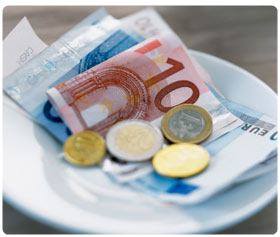I come from New York. A place where if you forget to tip a waiter or a taxi driver you might well fear for your life – or in any event be subject to an unpleasant berating. So, what a pleasure to live in a country where tipping is still more or less up to you, the customer.
Don’t get me wrong. Tipping is of course appreciated; it is rare to find someone in Italy who will actually refuse a tip, especially after a year of Covid. But if you don’t feel like giving one, or don’t have the right amount of money, no problem. And this makes life easier. Less stress.
Say you arrive in another city and check into your hotel. You are tired. You need to change right away and go out. Or you need urgently to go to the bathroom. Your wallet is at the bottom of your purse. Or you don’t have anything smaller than a €50 bill. What to do? Nothing. In the first place, the person who brought your bags up will not be standing there and staring at you. And if you have any experience of Italian (actually, European) hotels, you know you will see the person another time. Or, you can always leave tips with the front desk when you depart. If you want.
Some Italian restaurants add a service charge, and some add a charge for bread, and yet others a cover charge – il coperto – an Italian invention which by the way supposedly dates back to the Middle Ages when some people brought their own food or drink to an inn and therefore paid for occupying a place, maybe next to the fire, and using the chairs, table and utensils.

Some Italian regions, specifically Lazio (where Rome is) have barred the use of the coperto, so you could legitimately refuse to pay it. But any other extra charges, such as service (15 to 20%) or bread, are legit BUT ONLY IF they are written in the menu that you looked at when you sat down and before you ordered.
It’s never been entirely clear what the service charge in restaurants is supposed to cover. One big difference between Italy and the US is that servers do not depend on tips for survival. By law they are supposed to have regular work contracts and hence regular salaries. When I go to a restaurant – and it’s the same for most of the people I know – one always leaves something on the table. Probably because I am American, I tend to leave ten percent, whether or not the bill had a service charge on it. But the fact is, you could leave absolutely nothing and nothing would happen. Same thing at the hairdresser. No service charge here and you would only tip a stylist if he is not the owner – or one of the owners – and probably you would give a few euros to the shampooist. Or not. Again no stress.
But the biggest difference, at least to a New Yorker, concerns taxi drivers. And I’m talking about rides in the city, not transportation to the airport where help with luggage or in getting you a cart would merit a decent gratuity. Guess what a Roman taxi driver says to you if you round off the in-city €11.60 charge on the meter to €12.00, which means a tip of only 40 (or could be even 20) cents? “Grazie. Molto gentile.” Have I made my point?







Any comments? We’d love to hear them!